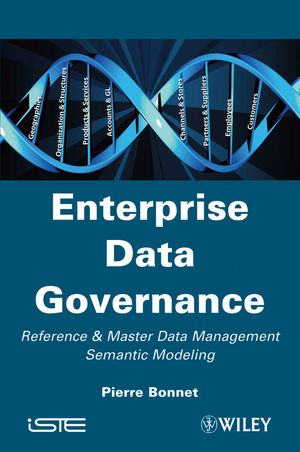Enterprise Data Governance: Reference and Master Data Management Semantic ModelingISBN: 978-1-84821-182-7
Hardcover
320 pages
July 2010, Wiley-ISTE
 |
||||||
Testimonials from the MDM Alliance Group xiii
Foreword xxv
Preface xxix
Acknowledgements xxxix
Introduction to MDM xli
PART ONE: THE MDM APPROACH 1
Chapter 1. A Company and its Data 3
1.1. The importance of data and rules repositories 3
1.2. Back to basics 6
1.3. Reference/Master data definition 12
1.4. Searching for data quality 19
1.5. Different types of data repositories 27
Chapter 2. Strategic Aspects 37
2.1. Corporate governance 37
2.2. The transformation stages of an IT system 42
2.3. Sustainable IT Architecture 51
Chapter 3. Taking Software Packages into Account 57
3.1. The dead end of locked repositories 57
3.2. Criteria for choosing software packages 59
3.3. Impact for software vendors 63
3.4. MDM is also a software package 65
Chapter 4. Return on Investment 69
4.1. Financial gain from improved data quality 69
4.2. The financial gain of data reliability 71
4.3. The financial gain of mastering operational risks 74
4.4. The financial gain of IS transformation 77
4.5. Summary of the return on investment of MDM 83
PART TWO: MDM FROM A BUSINESS PERSPECTIVE 87
Chapter 5. MDM Maturity Levels and Model-driven MDM 89
5.1. Virtual MDM 89
5.2. Static MDM 92
5.3. Semantic MDM 95
5.4. The MDM maturity model 100
5.5. A Model-driven MDM system 103
Chapter 6. Data Governance Functions 109
6.1. Brief overview 109
6.2. Ergonomics 111
6.3. Version management 112
6.4. The initialization and update of data by use context 114
6.5. Time management 118
6.6. Data validation rules 122
6.7. The data approval process 128
6.8. Access rights management 129
6.9. Data hierarchy management 130
6.10. Conclusion 131
Chapter 7. Organizational Aspects 133
7.1. Organization for semantic modeling 133
7.2. The definition of roles 146
7.3. Synthesis of the organization required to support the MDM 148
PART THREE: MDM FROM THE IT DEPARTMENT PERSPECTIVE 151
Chapter 8. The Semantic Modeling Framework 153
8.1. Establishing the framework of the method 153
8.2. Choosing the method 161
8.3. The components of Enterprise Data Architecture 172
8.4. The drawbacks of semantic modeling 178
8.5. Ready-to-use semantic models 180
Chapter 9. Semantic Modeling Procedures 187
9.1. A practical case of semantic modeling: the address 187
9.2. Example of Enterprise Data Architecture 199
9.3. Semantic modeling procedures 202
Chapter 10. Logical Data Modeling 215
10.1. The objectives of logical modeling 215
10.2. The components of logical data modeling 216
10.3. The principle of loose-coupling data 217
10.4. The data architecture within categories 221
10.5. Derivation procedures 221
10.6. Other logical modeling procedures 229
Chapter 11. Organization Modeling 233
11.1. The components of pragmatic modeling 234
11.2. Data approval processes 235
11.3. Use cases 239
11.4. Administrative objects 243
11.5. The derivation of pragmatic models to logical models 244
Chapter 12. Technical Integration of an MDM system 247
12.1. Integration models 248
12.2. Semantic integration 254
12.3. Data synchronization 258
12.4. Integration with the BRMS 261
12.5. Classification of databases and software development types 263
Conclusion 267
Appendix. Semantic Modeling of Address 271
A.1. The semantic model 272
A.2. Examples of screens generated by Model-driven MDM 277
A.3. Semantic modeling and data quality 282
A.4. Performance 282
A.5. Lifecycle of the Address business object 282
A.6. Insight into the XML schema 283
Bibliography 285
Index 287



